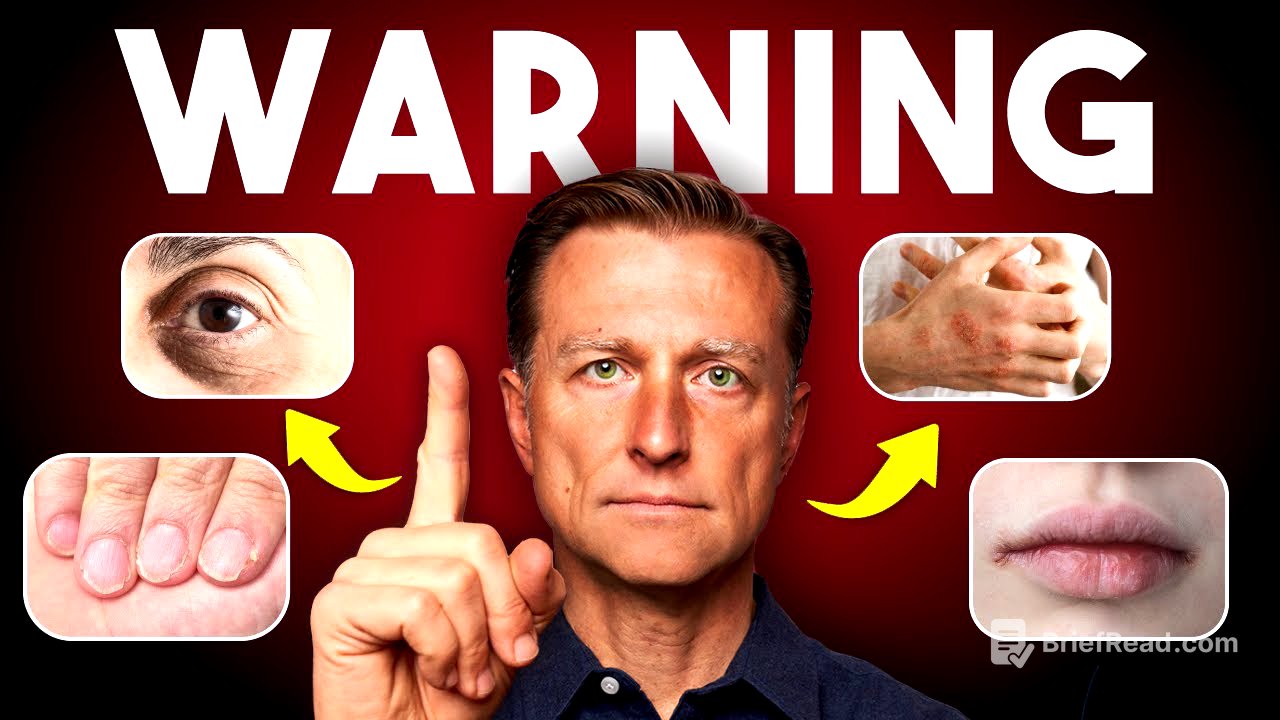TLDR;
This video discusses 18 signs of nutritional deficiencies, emphasizing the importance of addressing the root cause rather than just treating the symptoms. It covers deficiencies related to blood sugar issues, fungal overgrowth, vitamin and mineral deficiencies (B1, C, B6, biotin, iodine, magnesium, zinc, K1, E, A, sodium, omega-3), and their corresponding symptoms like skin tags, itchy skin, restless legs, bleeding gums, chronic cough, carpal tunnel syndrome, brittle nails, cold extremities, muscle cramps, ulcers, nosebleeds, chest pain, skin bumps, fatigue, decreased libido, dry skin, and white spots on nails. The video also recommends specific foods and supplements to correct these deficiencies and suggests watching another video for comprehensive dietary advice.
- Addressing the root cause of nutritional deficiencies is crucial rather than just treating the symptoms.
- Sugar consumption is a common factor that contributes to many deficiencies.
- Specific vitamins and minerals are highlighted for their roles in addressing various health issues.
Introduction: 18 signs of nutritional deficiencies [0:00]
The video introduces 18 signs indicating nutritional deficiencies in the body. It stresses the importance of identifying and treating the underlying causes of these deficiencies rather than merely addressing the symptoms. The video aims to provide insights into both the signs and their root causes to promote a more effective approach to health.
Skin tags [0:11]
Skin tags are benign indicators of underlying blood sugar issues, suggesting pre-diabetes or diabetes. An A1C test above 5.7 indicates pre-diabetes. Reversing diabetes can be achieved by reducing carbohydrates (sugars and starches) and increasing high-quality protein intake from meat. Research suggests type 2 diabetes can be reversed in less than 10 weeks through dietary changes.
Itchy private parts [0:46]
Itchy private parts or general body itching, especially at night, indicates fungal overgrowth on the skin, often due to antibiotic or steroid use, which wipes out beneficial bacteria that control fungus. Fungus, candida, and yeast thrive on sugar, leading to sugar cravings. Starving these microorganisms by eliminating sugar is the best strategy. Vitamin D can also boost the immune system and reduce itching.
Restless legs syndrome and vitamin B1 deficiency [1:24]
Nighttime restlessness, particularly restless legs syndrome, is often due to a vitamin B1 (thiamine) deficiency, which leads to lactic acid buildup. Vitamin B1 is essential for burning fuel and preventing lactic acid accumulation. Magnesium is a helper mineral that enhances B1's effectiveness. B1 deficiency is commonly caused by excessive consumption of carbohydrates and sugars.
Bleeding gums and vitamin C deficiency [2:36]
Bleeding gums indicate a vitamin C deficiency. Scurvy, an advanced form of vitamin C deficiency, highlights the importance of vitamin C for collagen production, which keeps capillaries strong. Sugar blocks vitamin C absorption. It's recommended to consume whole food vitamin C complexes or foods high in vitamin C, such as bell peppers, kiwis, lemons, and limes, rather than synthetic ascorbic acid.
Chronic cough [3:11]
A chronic cough can stem from either a calcium deficiency or acid reflux irritating the throat and vocal cords. Digestive issues, heartburn, or burning in the esophagus suggest acid reflux, which can be addressed by increasing salt intake or using betaine hydrochloride. If digestive issues are absent, calcium may be needed, preferably from high-quality cheese. Calcium can also help children with coughs or fevers.
Carpal tunnel syndrome [4:02]
Carpal tunnel syndrome, characterized by pain or swelling in the wrists, is often due to a vitamin B6 deficiency. B6 is essential for reducing swelling and protecting nerves. Pregnant women commonly experience carpal tunnel syndrome and nausea due to B6 depletion. P5P is the recommended form of B6 to alleviate these symptoms.
Brittle nails [4:34]
Brittle nails are a classic sign of biotin deficiency. Insufficient biotin levels can cause nails to break easily. Taking a biotin supplement can help strengthen the nails.
Cold feet and hands [4:45]
If you often feel cold, especially in your feet or hands, it may indicate an iodine deficiency. Consuming iodine in the form of seaweed or shellfish can help alleviate this issue.
Magnesium deficiency [4:56]
Magnesium deficiency can manifest as cramps in the legs, migraine headaches, and even chest pain resembling a potential heart attack, particularly in the early morning. Magnesium levels are at their lowest during this time due to circadian rhythms. Taking magnesium glycinate before sleep can help maintain adequate levels and improve sleep quality.
Chest pain [5:59]
Chest pain, pain down the left arm, or pain in the left shoulder related to the heart often indicates a vitamin E deficiency. Vitamin E deficiency lowers oxygen-carrying capacity, especially in the heart, and affects breathing at high altitudes. Tocotrienols are the best form of vitamin E to address these symptoms.
Sodium deficiency [6:52]
Sodium deficiency can lead to fatigue, insomnia, and weak muscles. Increasing salt intake can quickly alleviate these symptoms.
Dry, scaly skin [7:20]
Dry, scaly skin indicates an imbalance with too much omega-6 fats and not enough omega-3 fats. This is often due to consuming a lot of seed oils and not enough fish oils. Good sources of omega-3 include cod liver oil, fish oil, sardines, and wild-caught salmon.









